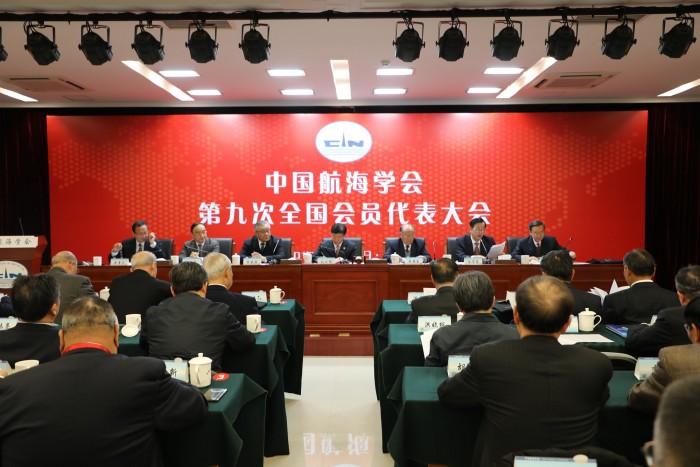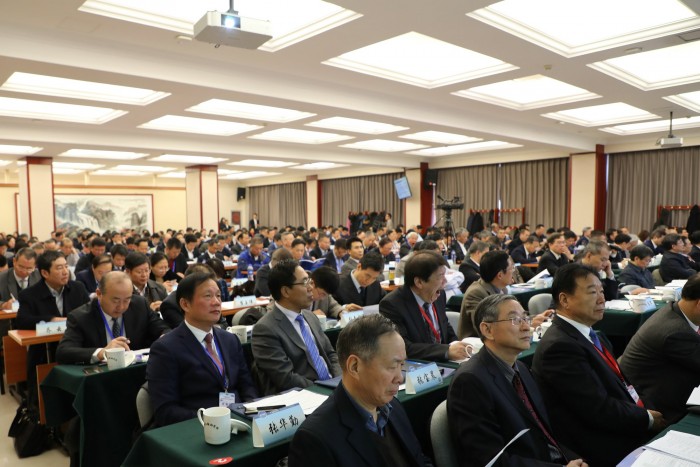He Jianzhong Elected as the Ninth Chairman
On November 30, the China Institute of Navigation(CIN) held the 9th National Assembly in Beijing. Liu Xiaoming, Vice Minister of Ministry of Transport, and Wang Shoudong, Party Member of the China Association for Science and Technology (CAST) attended the meeting and delivered speeches. They stressed that CIN should be built into a large platform for China’s academic exchanges in navigation, a main channel for popularization of technology and a new think tank in the field of navigation, making new and greater contributions to the development of China’s maritime industry and accelerating the construction of a powerful nation in transportation. At the 1st session of the 9th CIN Council held later, He Jianzhong, Former Vice Minister of Ministry of Transport, was elected Chairman of the 9th Council. Former leaders of the Ministry of Transport, including Huang Zhendong, Li Shenglin, Lin Zuyi, Hong Shanxiang, Yang Limin, Weng Mengyong, Gao Hongfeng and Xu Zuyuan, attended the conference.
Liu Xiaoming fully affirmed the achievements made by CIN in recent years. He said that CIN was home to a large number of navigation science and technology workers. It boasted rich resources, extensive contacts, featuring cross disciplinary and base-rooted connections. It is hoped that CIN will give full play to its functions to support the development of transportation, especially the maritime industry. It could be actively strategic, basic, forward-looking, focus on hot, tough and focal issues of the industry to ensure its role of platforms and cooperation. It could help organize relevant experts’ investigation and research, scientific research institutes to tackle key problems and conduct collaborative research and development, and put forward scientific suggestions for transportation development decision-making, as a competent consultant and assistant. And it could add new impetus, open up new ways and play a new role in accelerating the construction of a powerful transportation country.
He Jianzhong said that CIN should strive to become a bridge of both the Party and the government to link up with navigation science and technology workers, a science and technology think tank for government decision-making and consultation, an important channel for training, and recommend navigation science and technology talents and achievements, as a front line for inheriting and developing navigation culture. It should make every effort to achieve innovation and guidance, industry reliance, social trust and member satisfaction to actively create an academic group of world-class institute. Looking forward to the future development, He Jianzhong stressed that the priority was serving the national strategy. We should focus on accelerating the construction of a powerful transportation country and give full play to the driving role of navigation science and technology innovation. We should focus on the construction of ‘the Belt and Road Initiative’ and give full play to the leading role of shipping. We should focus on the regional development strategy and give full play to the cooperative role of CIN. The second objective is to actively build an exchange platform. We should do a high quality job in China Maritime Day Forum, build a cross-domain, cross-sector, multi-level and multi-channel platform of high-end and cutting-edge academic exchange, continuously deepen international and regional exchanges and cooperation, and improve the platform for effectively undertaking government transfer functions. The third objective is to accelerate the construction of think tanks. We should focus on the strategy of cultivating a marine power and the development of navigation science, technology and education and organize in-depth research to establish a think tank framework system and propose new technologies, measures, and paths for the high-quality development of the maritime industry. The fourth is to vigorously promote the navigation culture. We should study the spirit of navigation in the new era, compile a series of cultural series on navigation, publicize the model of the times for practicing the spirit of navigation, and create a good atmosphere for the prosperity and development of navigation culture. The fifth is to practically strengthen self-construction. We should strengthen the leadership of the party, improve the functions, enhance service awareness, strictly regulate behaviors, and fully ensure positive results through scientific and technological services, talents by means of member services, standards via industry services and efficiency by system services.
It was reported that the China Institute of Navigation was founded in 1979. In the past 40 years, it has developed into an academic organization with sound institutional structure, extensive disciplines, great influence and authority and an important social force for China to develop navigation science and technology. In 2018, CIN was approved to host the 18th (2024) World Conference of International Association of Institutes of Navigation. It is 30 years later that China was assigned the right for a second time to host the International Association of Institutes of Navigation World Congress and became the Association’s senior vice president and president-elect country. CIN has been participating in the ‘China Maritime Day’ activities for 15 consecutive years, hosted 5 meetings on ‘China Maritime Day Forum’, held more than 1800 domestic academic exchange events, successfully held 33 national youth maritime summer camps, established 41 nationwide maritime science education bases, and appraised and assessed over 700 scientific research achievements in the field of navigation in the past decade.
背景资料
助力航海科技 弘扬航海文化
——中国航海学会成立40年综述
中国航海学会(英文名称:CHINA INSTITUTE OF NAVIGATION,缩写:CIN)是由从事航海工作的有关单位和人员自愿组成、并依法登记成立的全国性、学术性、非营利性社会组织,具有社会团体法人资格,是中国共产党和政府联系航海科技工作者的桥梁和纽带,是国家发展航海科技事业的重要社会力量。
学会的宗旨是:弘扬航海文化,尊重知识、尊重人才;倡导“献身、创新、求实、协作”精神,团结和组织航海科技工作者,坚持党的基本路线,以经济建设为中心,坚持科学技术是第一生产力的指导思想,实施科教兴国、人才强国和可持续发展的战略,深入落实科学发展观,促进航海事业的繁荣和发展,促进航海科学技术人才的成长和提高,促进科学技术与经济的结合,为社会主义物质文明和精神文明建设服务。
经中国科协批准,中国航海学会第一次全国会员代表大会于1979年4月1日在广州召开。40年来,伴随着我国改革开放的进程和中国航海事业的迅速发展,在中国科协、交通运输部和原交通部的坚强领导下,在历届理事长曾生同志、彭德清同志、林祖乙同志、洪善祥同志、徐祖远同志、黄有方同志的带领下,中国航海学会紧紧围绕党的奋斗目标和国家中心任务开展工作,紧密团结全国航海科技工作者,有效发挥了航海科技社团在推动科技进步和航海事业发展中的独特作用,成为中华民族伟大复兴中国梦奋斗征程中一支积极的社会力量。
不断提升自身能力建设
学会积极开展综合治理改革工作,内部治理机制得到不断强化。经中国科协批准,学会在理事会层面成立功能性党委和办事机构党支部,实现学会党建工作双覆盖,彰显了“党建强会”工作的功能作用。同时,学会不断完善管理制度,强化网络信息化建设和服务管理系统升级,逐步提升学会自身建设能力和综合服务水平。
1999年和2017年,中国航海学会两次被科技部、中央宣传部、中国科协评为“全国科普工作先进集体”。2014年--2018年,又连续五年被中国科协评为“全国学会科普先进单位”。2015年—2017年,学会参与中国科协“提能工程”,获得连续三年专项资助。2018年学会跻身中国科协“世界一流学会建设”项目,再次获得连续三年专项资助。
不断推动航海学术进步
学术交流活动既是学术社团生命力的重要标志,也是引领行业科技进步的重要途径和手段。中国航海学会历届理事会都高度重视航海学术交流工作、高度重视航海学术交流活动对航海科技人才的凝聚作用和对学会发展的促进作用。坚持把开展学术交流活动作为立命之本,构建以学术年会、专题论坛和秘书长沙龙三位一体的学术交流平台,多渠道、多层次地组织开展国内外学术交流研讨,推广研究成果,培育学术人才,掌握学科前沿动向,推动航海科技进步。
40年来,中国航海学会以服务航海科技进步和人才培养为已任,积极开展科技项目报奖、科技成果评估和举荐航海科技人才等工作。近10年来,学会组织力量,先后鉴定评估航海领域各单位申报的科研成果超过700项。
中国航海学会连续三年承办“世界交通运输大会”航海板块系列活动。今年10月20日,中国航海学会还精心筹划召开了首届世界海事大会。据不完全统计,截至2018年,中国航海学会共举办国内学术交流活动1800余次。
不断拓展对外交流合作
40年来,中国航海学会坚持开放融合理念,关注和参与全球航海领域学术交流活动,通过参加国际会议、举办国际论坛、召开国际研讨会等形式深化国际交流,保持国际视野,持续增强学术互动性和影响力。学会先后加入国际航行学会联合会、国际内河电子航道图协调组织、亚太港口服务组织、国际海上救助联盟、国际救捞联合会等多个国际组织,持续提高了我国在全球航海领域里的话语权和影响力。中国航海学会也在时隔30年后再次获得国际航行学会联合会2024年世界大会的主办权,并成为该联合会高级副主席和候任主席国家。
不断强化航海特色科普
40年来,中国航海学会积极普及航海科学知识,坚持不懈开展系列科普活动,积极构建以航海科技教育为依托的现代科普体系,着力培育“蓝色基因”。
40年来,中国航海学会先后组织编写出版了《中国航海史》《中国船谱》《中国水运史丛书》《中国救捞史》等一大批航海史书,丰富了珍贵的航海历史文化。学会还通过航海科普讲堂,组织科普作品大赛,以及利用线上线下互动等多种方式,努力扩大航海科普知识受众面。学会主动参与和推动“中国航海日”的设立工作,连续参与主办15届“中国航海日论坛”活动;成功举办了34届全国青少年航海夏令营,先后在全国成立了41家航海科普教育基地,航海大科普工作格局逐步形成。
不断增强社会服务能力
40年来,中国航海学会积极着眼国家、行业、会员的需求,汇聚航海学科综合优势,不断增强社会服务能力。2000年,交通部正式授权中国航海学会承担船舶系列高级专业技术职务任职资格的组织评审工作。截至2018年底,先后评定出2100名航海工作者获得了担任高级船长、高级轮机长、高级引航员、高级电机员和高级报务员的资格。
中国航海学会还瞄准社会热点问题,就南海水域船舶航行安全状况,联合上海海事大学进行专题研究,连续三年发布《南海航行状况研究报告》,并共同成立“全球航行状况研究中心”。
纵观40年的发展历史,中国航海学会已经成为我国全面推进航海事业发展的一支不可或缺的重要力量,成为我国航海事业中历史悠久、领域齐全、会员覆盖面广,在航海科技领域享有崇高声誉的重要社会团体,成为党和政府团结联系航海科技工作者的桥梁和纽带。
中国航海学会以构建现代法人治理结构和运行机制为目标,按照学会章程规定和民主办会的原则,独立负责地开展工作,并根据政社分开、权责明确、依法自治、自主运行、有序竞争、优化发展的要求,不断提升学会创新发展和服务能力,建设依法设立、自主办会、服务为本、治理规范、行为自律的现代社会组织。
相关:中国航海学会主要业务范围
(一)开展航海学术交流,活跃航海学术思想,促进航海学科发展和学术规范,提高航海科技水平,推动航海科技的自主创新;
(二)弘扬航海科学精神,加强航海文化建设,普及航海科学知识,推广先进航海技术和科学管理经验,开展青少年航海科技活动;
(三)承接政府部门委托(转移)事项,组织或参与对国家航海事业发展战略、政策和建议中的重大项目进行决策论证,提出决策建议;
(四)按照规定经政府有关部门批准开展以下工作:
1. 组织、开展航海科技奖、航海青年科技奖评审和奖励工作以及科技成果鉴定工作;
2. 表彰、奖励在航海活动中取得优秀成绩的航海科技工作者、航海院校上船专业的学生,推荐人才。
(五)开展航海产业及其相关领域内的技术咨询、服务、转让和展品展览等工作,促进科学技术成果的转化;
(六)组织航海类继续教育和技术培训,接受委托承担专业技术职务资格评定工作、科技文献和标准的编审工作;
(七)组织编辑出版航海科技书刊、文集,研究与编写中国航海类史书,传播航海科技信息;
(八)组织开展国际航海科技交流活动,促进国际间航海科技合作,发展同国外航海科技团体和科技工作者的友好交往;
(九)充分发挥本团体在航海科技界、学术界、企业界的凝聚优势,发展和加强与港、澳、台地区航海工作者、科技团体及企业界的联系和学术交流;
(十)维护本团体会员的合法权益,反映本团体会员的意愿和要求,举办为本团体会员服务的活动;
(十一)为航海事业的发展、为保证航行安全以及为自身发展的需要,开展其他必要的工作。
学会目前拥有22个专业委员会、2个期刊编委会、320多家单位会员,学会事业发展基础稳固。
(详情可查阅中国航海学会官网https://www.cinnet.cn/)


